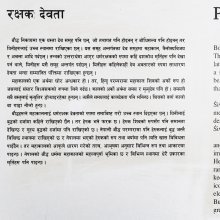Bhumika, Bhūmikā, Bhūmika: 19 definitions
Introduction:
Bhumika means something in Hinduism, Sanskrit, Jainism, Prakrit, Marathi, Hindi. If you want to know the exact meaning, history, etymology or English translation of this term then check out the descriptions on this page. Add your comment or reference to a book if you want to contribute to this summary article.
Images (photo gallery)
In Hinduism
Mīmāṃsā (school of philosophy)
Source: Srimatham: Mīmāṃsa: The Study of Hindu ExegesisBhūmika (भूमिक) refers to “one’s level of development” and is one of the six factors through which positive ethical precepts (regarding Dharma) are conditioned. The discerning student is required to distinguish between grades of vidhi or to compare their levels of authority or applicability. The primary distinction is derived from their motivation and goals, thus producing the concepts of puruṣārtha and kratvārtha.

Mimamsa (मीमांसा, mīmāṃsā) refers to one of the six orthodox Hindu schools of philosophy, emphasizing the nature of dharma and the philosophy of language. The literature in this school is also known for its in-depth study of ritual actions and social duties.
Natyashastra (theatrics and dramaturgy)
Source: Wisdom Library: Nāṭya-śāstraBhūmikā (भूमिका) refers to “role of an actor” according to the Nāṭyaśāstra chapter 35. Accordingly, Bhūmikā refers to “the distribution of roles in a play or of the kinds of men by which different roles are to be represented”. Also, “After considering together their gait, speech and movement of limbs as well as their strength and nature, the experts are to employ actors to represent different roles in a play”.

Natyashastra (नाट्यशास्त्र, nāṭyaśāstra) refers to both the ancient Indian tradition (shastra) of performing arts, (natya—theatrics, drama, dance, music), as well as the name of a Sanskrit work dealing with these subjects. It also teaches the rules for composing Dramatic plays (nataka), construction and performance of Theater, and Poetic works (kavya).
Shaktism (Shakta philosophy)
Source: Google Books: ManthanabhairavatantramBhūmikā (भूमिका) refers to the “plane” (or state), according to the Manthānabhairavatantra, a vast sprawling work that belongs to a corpus of Tantric texts concerned with the worship of the goddess Kubjikā.—[...] The term Nirvāṇakalā/—śakti is unknown to the Kubjikā Tantras, but the goddess, as the Divine Yoni, is identified with the plane or state (bhūmikā) of Nirvāṇa. As Śāmbhavī, she is the Plane of Knowledge (jñāna-bhūmikā) which is Nirvāṇa and Supreme Nectar. At the same time she is also the radiant energy (tejomayī) that issues from Nirvāṇa, the Supreme Principle and bestows its bliss. [...]

Shakta (शाक्त, śākta) or Shaktism (śāktism) represents a tradition of Hinduism where the Goddess (Devi) is revered and worshipped. Shakta literature includes a range of scriptures, including various Agamas and Tantras, although its roots may be traced back to the Vedas.
Kama-shastra (the science of Love-making)
Source: Shodhganga: Elements of Art and Architecture in the Trtiyakhanda of the Visnudharmottarapurana (kama)Bhūmikā (भूमिका) refers to the “floor”.—Cf. Maṇibhūmikākarma, which refers to “decoration of the floor”, representing one of the “sixty four kinds of Art”, according to the Kāmasūtra of Vātsyāyaṇa.—Indian tradition, basically includes sixty four Art forms are acknowledged. The references of sixty four kinds of kalā are found in the Bhāgavatapurāṇa, Śaiva-Tantras, Kāmasūtra of Vātsyāyaṇa etc.

Kamashastra (कामशास्त्र, kāmaśāstra) deals with ancient Indian science of love-making, passion, emotions and other related topics dealing with the pleasures of the senses.
Vastushastra (architecture)
Source: Shodhganga: Elements of Art and Architecture in the Trtiyakhanda of the Visnudharmottarapurana (vastu)Bhumikā (भुमिका) refers to the “storey” parts of the Hindu Temple, according to the Viṣṇudharmottarapurāṇa, an ancient Sanskrit text which (being encyclopedic in nature) deals with a variety of cultural topics such as arts, architecture, music, grammar and astronomy.—Bhumikā means the storey of a temple. In the Viṣṇudharmottarapurāṇa it is stated that the storey of a temple should be constructed in the shape of bhadrapīṭha i.e., the storeys should be built one on top of the other. It is also mentioned that the length of the storey (bhumikā) should be half of its height. Moreover, in the 11th chapter of Mānasāra called bhūmilamba-vidhāna, the dimensions of different storeys (bhumikā) are nicely described. Here, the counting of storeys starts from one and ends with twelve. According to this treatise, the temples should have one to twelve storeys. The Viṣṇudharmottarapurāṇa also talks about temples up to twelve storeys. This signifies that this book refers to even high rise temples.

Vastushastra (वास्तुशास्त्र, vāstuśāstra) refers to the ancient Indian science (shastra) of architecture (vastu), dealing with topics such architecture, sculpture, town-building, fort building and various other constructions. Vastu also deals with the philosophy of the architectural relation with the cosmic universe.
In Jainism
General definition (in Jainism)
Source: The University of Sydney: A study of the Twelve ReflectionsBhūmikā (भूमिका) refers to the “floor (of a theatre)”, according to the 11th century Jñānārṇava, a treatise on Jain Yoga in roughly 2200 Sanskrit verses composed by Śubhacandra.—Accordingly, “Like an actor here on the stage [com.—raṅga-bhūmikā—‘the floor of a theatre’], the embodied soul continually takes on individual characters [and] he abandons others. Sentient beings, inflamed by very intense pleasure [and] unsteady from affliction by wrong faith, wander about in a five-fold life that is difficult to be traversed”.

Jainism is an Indian religion of Dharma whose doctrine revolves around harmlessness (ahimsa) towards every living being. The two major branches (Digambara and Svetambara) of Jainism stimulate self-control (or, shramana, ‘self-reliance’) and spiritual development through a path of peace for the soul to progess to the ultimate goal.
Languages of India and abroad
Marathi-English dictionary
Source: DDSA: The Molesworth Marathi and English Dictionarybhūmikā (भूमिका).—f S The earth. 2 Theatrical dress; the costume of a character represented on the stage. 3 Place (of action); stage, theatre, arena. Ex. āpaṇa hyā karmabhūmikēnta āhōṃ tōmparyanta sarva karma kēlēṃ pāhijē. 4 Ground, footing, place of standing or resting.
Source: DDSA: The Aryabhusan school dictionary, Marathi-Englishbhūmikā (भूमिका).—f The earth. Theatrical dress; the part played; stage.
Marathi is an Indo-European language having over 70 million native speakers people in (predominantly) Maharashtra India. Marathi, like many other Indo-Aryan languages, evolved from early forms of Prakrit, which itself is a subset of Sanskrit, one of the most ancient languages of the world.
Sanskrit dictionary
Source: DDSA: The practical Sanskrit-English dictionaryBhūmikā (भूमिका).—
1) Earth, ground, soil.
2) A place, region, spot (of ground).
3) A story, floor (of a house); गृहोपरि° (gṛhopari°) the flat roof of a house.
4) Step, degree; मधु- मतीसंज्ञां भूमिकां साक्षात्कुर्वतः (madhu- matīsaṃjñāṃ bhūmikāṃ sākṣātkurvataḥ) Yoga. S.; or नैयायिकादिभिरात्मा प्रथमभूमिकायामवतारितः (naiyāyikādibhirātmā prathamabhūmikāyāmavatāritaḥ) Sāṅkhyapravachanabhāṣya.
5) A tablet or board, as for writing; see अक्षरभूमिका (akṣarabhūmikā).
6) A part or character in a play; या यस्य युज्यते भूमिका तां खलु तथैव भावेन सर्वे वर्ग्या पाठिताः (yā yasya yujyate bhūmikā tāṃ khalu tathaiva bhāvena sarve vargyā pāṭhitāḥ); कामन्दक्याः प्रथमां भूमिकां भाव एवाधीते (kāmandakyāḥ prathamāṃ bhūmikāṃ bhāva evādhīte) Mālatīmādhava (Bombay) 1; or लक्ष्मीभूमिकायां वर्तमानोर्वशी वारुणीभूमिकायां वर्तमानया मेनकया पृष्टा (lakṣmībhūmikāyāṃ vartamānorvaśī vāruṇībhūmikāyāṃ vartamānayā menakayā pṛṣṭā) V.3; Śiśupālavadha 1.69; (anyarūpairyadanyasya praveśaḥ sa tu bhūmikā Bharata).
7) Theatrical dress, an actor's costume.
8) Decoration (as of an image).
9) A preface or introduction to a book.
Source: Cologne Digital Sanskrit Dictionaries: Edgerton Buddhist Hybrid Sanskrit DictionaryBhūmika (भूमिक).—(-bhūmika), ifc. (bhūmi 4 plus -ka), belonging to… stage, of Bodhisattvas, in eka-°kāḥ, dvi-°kāḥ, etc., down to daśa-°kāḥ: Kāraṇḍavvūha 64.10 ff.; (also in other mgs. of bhūmi, e.g.) kuto-bhūmikas tvaṃ Mūla-Sarvāstivāda-Vinaya iii.143.10, from what country are you?
Source: Cologne Digital Sanskrit Dictionaries: Shabda-Sagara Sanskrit-English DictionaryBhūmikā (भूमिका).—f.
(-kā) 1. Theatrical dress, the costume of any character, represented on the stage. 2. Decorating images, temples, gateways, &c. 3. A board for writing. 4. A preface, an introduction. 5. A floor. 6. A place. 7. A step, a degree. 8. Earth, soil. E. bhūmi place of being, and kan aff.
Source: Cologne Digital Sanskrit Dictionaries: Benfey Sanskrit-English DictionaryBhūmikā (भूमिका).—[bhūmi + kā], f. 1. Change-of costume in order to represent a different character on the stage. 2. Decorating images, temples, gateways, etc. 3. A story; grihoparibhūmikāyām āruḍhaḥ, He mounted to the upper story of the house, Śukas. cod. Petersb. p. 31, b. 4. A preface to a book.
Source: Cologne Digital Sanskrit Dictionaries: Cappeller Sanskrit-English DictionaryBhūmikā (भूमिका).—[feminine] the earth, ground, place for (—°); floor or story of a house, step, degree ([figuratively]), part, character, costume ([drama]).
Source: Cologne Digital Sanskrit Dictionaries: Monier-Williams Sanskrit-English Dictionary1) Bhūmikā (भूमिका):—[from bhū] f. earth, ground, soil, [Kāśikā-vṛtti; Kathāsaritsāgara] etc.
2) [v.s. ...] (ifc.) a spot, place for (e.g. āhāra-bh, an eating-place, [Kathāsaritsāgara]; akṣara-bh, a place id est. a tablet for writing, [Raghuvaṃśa])
3) [v.s. ...] a story, floor, [Inscriptions; Pañcatantra] (with gṛhopari, the flat roof of a house, [Śukasaptati])
4) [v.s. ...] a step, degree, [Yoga-sūtra]
5) [v.s. ...] (in [dramatic language]) an actor’s part or character, [Vikramorvaśī; Mālatīmādhava] etc.
6) [v.s. ...] decoration (as of an image), [cf. Lexicographers, esp. such as amarasiṃha, halāyudha, hemacandra, etc.]
7) [v.s. ...] preface, introduction, [Chāndogya-upaniṣad [Scholiast or Commentator]; Kāvyādarśa]
Source: Cologne Digital Sanskrit Dictionaries: Yates Sanskrit-English DictionaryBhūmikā (भूमिका):—(kā) 1. f. Theatrical dress; decorating images, &c.
Source: DDSA: Paia-sadda-mahannavo; a comprehensive Prakrit Hindi dictionary (S)Bhūmikā (भूमिका) in the Sanskrit language is related to the Prakrit word: Bhūmiā.
[Sanskrit to German]
Sanskrit, also spelled संस्कृतम् (saṃskṛtam), is an ancient language of India commonly seen as the grandmother of the Indo-European language family (even English!). Closely allied with Prakrit and Pali, Sanskrit is more exhaustive in both grammar and terms and has the most extensive collection of literature in the world, greatly surpassing its sister-languages Greek and Latin.
Hindi dictionary
Source: DDSA: A practical Hindi-English dictionaryBhūmikā (भूमिका):—(nf) introduction; ground-work; background; role; -[bāṃdhanā] to prepare the background.
...
See also (Relevant definitions)
Starts with: Bhoomika-pradarshan, Bhumika-pradarshana, Bhumika-sangharsha, Bhumikabhaga, Bhumikadamba, Bhumikadambadi, Bhumikadambaka, Bhumikagata, Bhumikaika, Bhumikajaya, Bhumikajnana, Bhumikampa, Bhumikampalakshana, Bhumikampana, Bhumikandaka, Bhumikandali, Bhumikandara, Bhumikapala, Bhumikara.
Ends with (+12): Aksharabhumika, Alabdhabhumika, Ashrayabhumika, Baddhabhumika, Bahibhumika, Bahubhumika, Catubhumika, Caturbhumika, Dashabhumika, Dvibhumika, Ekabhumika, Janmabhumika, Jnanabhumika, Kishkindipandubhumika, Krishnabhumika, Madhubhumika, Mahabhumika, Manibhumika, Prasarabhumika, Pratipadik-bhoomika.
Full-text (+47): Saptabhumika, Madhubhumika, Sakriy-bhoomika, Bhumikabhaga, Pratipadik-bhoomika, Bhoomika-pradarshan, Saptabhumikavicara, Svarnabhumika, Dvi-bhumika, Dhumaka, Bhumikagata, Ekabhumika, Sihnabhumika, Bhumi, Janmabhumi, Krishnabhumika, Bahubhauma, Bhumia, Catubhumika, Dashabhumika.
Relevant text
Search found 32 books and stories containing Bhumika, Bhūmikā, Bhūmika, Bhoomika; (plurals include: Bhumikas, Bhūmikās, Bhūmikas, Bhoomikas). You can also click to the full overview containing English textual excerpts. Below are direct links for the most relevant articles:
Cidgaganacandrika (study) (by S. Mahalakshmi)
Verse 53 [Ṣaḍadhvātīta and Bheda Bhāva] < [Chapter 2 - Second Vimarśa]
Verse 83 [Ādyā Vimarśa Śakti is Kṣetrapāla] < [Chapter 3 - Third Vimarśa]
Shakti and Shakta (by John Woodroffe)
Chapter XII - Alleged conflict of Śāstras < [Section 1 - Introductory]
Chapter XXVIII - Matam Rutra (the Right and Wrong Interpretation) < [Section 3 - Ritual]
Thirty minor Upanishads (by K. Narayanasvami Aiyar)
Vishnudharmottara Purana (Art and Architecture) (by Bhagyashree Sarma)
4. The Viṣṇudharmottara-purāṇa and Temple Architecture of India < [Chapter 6 - Modern Relevance of Different Art Forms and Architecture]
5. Different Parts of a Temple < [Chapter 4 - Temple Building]
4. A General Note on Architecture < [Chapter 1 - Introduction]
Vastu-shastra (5): Temple Architecture (by D. N. Shukla)
Bhajana-Rahasya (by Srila Bhaktivinoda Thakura Mahasaya)
Related products


